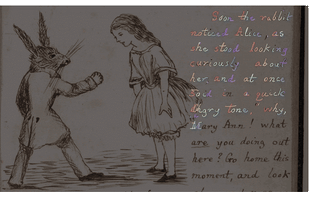Google Inksight lets you convert your scrappy handwriting to digital text using AI
Forget about OCR, let AI do it better

Google has just announced a new model technology called Insight, which it’s calling an ‘offline to online handwriting conversion tool’. Basically that means scanning a photo of handwritten text and extracting the letters using AI rather than optical scanning as with OCR.
The team has trained the model so it can actually ‘read’ and recognize words, and then employ digital handwriting methods to output accurate letters.
The developers claim that doing this handwriting conversion digitally is more resilient across various scenarios, such as dealing with badly lit photo sources and on-page artifacts. The fun, and maybe useful, feature is its ability to output digital content in the shape of normal handwriting.
For example, the team is suggesting that users could take their handwritten notes, convert them to a digital clone of their handwriting, edit the digital form, and then re-export the result in their original handwriting.
What can Inksight be used for?

The result of all this could be a document archive containing handwritten notes which could be freely edited, and yet retain the character of the original notes in digital form. It’s like having an indestructible version of your personal notes, available online, or on your computer, for permanent access.
Unsurprisingly a lot of interest in the new technology has come from academia and other groups, who have struggled for years to make OCR and scanners fit the need for fast, accurate notation and storage.
This becomes even more acute for field workers who don’t have access to specialized equipment. Think archaeological dig notes, insurance assessments and other similar situations.
Get instant access to breaking news, the hottest reviews, great deals and helpful tips.
At the moment their options are to store scrappy-paper notes or use pen and tablet-based computer transcription, which comes with its own set of accuracy issues.
Final thoughts
The technology is still in the research stage at the moment, but the results are looking promising for future development.
The team at Google has conducted tests showing that the output from the new models — they've released three different-sized versions — delivered results that in 87% of cases were considered good or with only minor defects.
It remains to be seen how long it will take before this form of AI reaches the hands of the public. But anyone who’s ever struggled with reading a GP’s prescription will cheer from the sidelines when it eventually does arrive.
More from Tom's Guide
- AI video generator Dream Machine just got a huge upgrade — now you can control the camera
- Hotshot is a new free text-to-video platform — and it’s very good indeed
- I put ChatGPT to the test to see how well it understands images — and you can see the results here

Nigel Powell is an author, columnist, and consultant with over 30 years of experience in the technology industry. He produced the weekly Don't Panic technology column in the Sunday Times newspaper for 16 years and is the author of the Sunday Times book of Computer Answers, published by Harper Collins. He has been a technology pundit on Sky Television's Global Village program and a regular contributor to BBC Radio Five's Men's Hour.
He has an Honours degree in law (LLB) and a Master's Degree in Business Administration (MBA), and his work has made him an expert in all things software, AI, security, privacy, mobile, and other tech innovations. Nigel currently lives in West London and enjoys spending time meditating and listening to music.
 Club Benefits
Club Benefits















